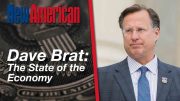
The evidence is mounting that the American economy is very far from being out of the woods. For one thing, the latest job reports show that 85,000 more jobs were lost during the month of December, leaving the shattered American economy with 7.2 million jobs fewer than in December 2007.
Official unemployment nationwide remains at 10 percent, but economists are now admitting what has been deliberately ignored for many months, that the real figure — adjusted to include those out of work who are no longer actively searching — is much, much higher, exceeding 15 percent. Some states, like Michigan, are showing official figures in excess of 17 percent, and, with the latest figures significantly worse than the consensus expectation, the jobs picture appears to be grim for years to come. If the last decade was characterized by net zero growth in terms of stocks, this decade may see little to no net job creation.
Meanwhile, the great stock rally of 2009 is being revealed as a bear market fraud. Small investors, who have helped to drive previous rallies, are sitting this one out; the recent runup in stock prices is being driven by big investment firms. According to a new report from the AP’s Bernard Condon:
After being key players in bull runs of the past, small-time investors have not only stopped buying, they’re selling. The question for the new year: If the man on the street doesn’t jump back in, will stocks continue to defy gravity?
So far, the market’s comeback is almost entirely due to buying by professional investors at hedge funds, pension funds, banks and other institutions.
“We’ve never seen this before — such a huge rally, and the little guy is out,” says Vincent Deluard, a strategist for TrimTabs Investment Research.
Last year saw small investors withdraw a net $14 billion from stock mutual funds, on top of $245 billion withdrawn in 2008. The money is being reinvested in bonds or other more conservative savings. This time around, the experts say, individual investors — whose money accounts for around 80 percent of the $19 trillion in stock held in U.S. companies — may be right to be bearish where the happy-talking big investment firms are unwarranted in their continued optimism. “People have been lured into two bubbles seven years apart, and for a lot of them it’s over,” David Rosenberg, chief economist at Toronto money manager Gluskin Sheff, told the Associated Press. “The bulls say if the market is up this much without retail investors, just watch when they come in, but it isn’t going to happen.”
Watch for stocks to come back to earth this calendar year and job losses to continue, as the Mother of All Recessions continues to run its course.



